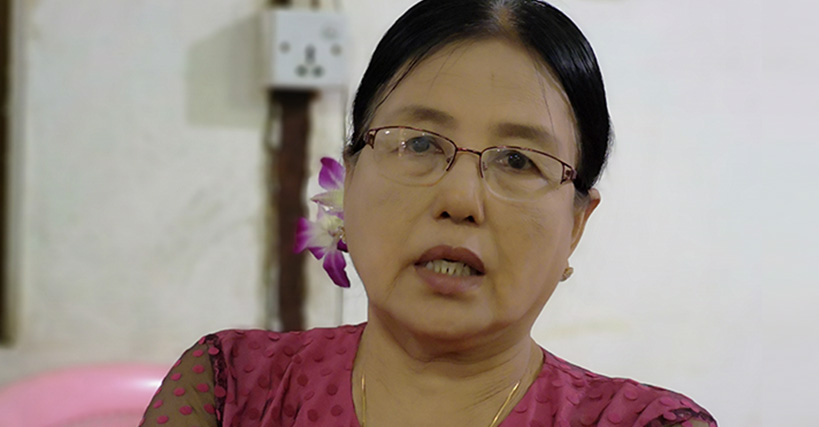The Arakan National Party (ANP) held its central committee and central executive committee meetings in the Rakhine State capital, Sittwe, for four days ending on Tuesday.
The discussions focused on the Rakhine State conflicts and the 2020 state and general elections. This week The Irrawaddy’s associate editor, Nyein Nyein, talked to Daw Aye Nu Sein, the vice chair of the ANP, at the party’s headquarters in Sittwe on the issues facing the impoverished state.
What are the aims of the meetings?
This is the second meeting with all of our central committee members and the party’s parliamentarians since our congress this year. We have discussed the 2020 elections, mobilizing our party and the current challenges that Rakhine State faces. We have also heard recommendations from our party leaders on how to move forward.
The ANP has been outspoken about the civilian victims of the current conflict. What works will the party carry out to help people displaced by the fighting?
We have our committees to take care of specific affairs and we have parliamentarians at both Union and state levels. We continue working for the people, both inside and outside parliament. Our efforts are for all state residents, regardless of whether they support the ANP.
What is the party doing for those fleeing their homes because of the fighting?
We talked a lot about the provisions of relief. We also spoke about why the fighting started, how to build peace and why peace is far away.
What would be effective ways for the government to tackle the IDP [internally displaced persons] issue and reduction of conflict?
As you all can see, both the Rakhine State and the central governments are very weak on provisions of relief for the IDPs fleeing fighting. The government’s spokesman, U Zaw Htay, said the government was trying to reach a bilateral ceasefire agreement. It seems the government will only provide support to IDPs when they [armed groups] sign an agreement. The government is using civilians as bargaining chips and these ordinary citizens are sandwiched between both sides.
If those groups do not sign the bilateral agreements, the innocent civilians will not receive aid. The Union government should not have this view.
The IDPs we have met are desperate to go back to their villages but they feel unsafe. What could the party do for them?
We can only call for peace and show compassion for those affected. Any group that has a heart should come forward for the ceasefire. We cannot resettle those IDPs back to their villages until the fighting stops. But the party is trying to offer as much support as we can to provide basic food and shelter for the IDP camps.

Some people think that northern Rakhine State might not be able to hold the 2020 general election. What are your concerns?
I don’t want to use the word “concern”. The dignity of the government would suffer if it cannot hold an election in many areas. The election is also being watched closely overseas. It is not only a domestic affair. Therefore, I don’t worry too much. But political bullying should be prevented.
What are your ambitions for the ANP in the 2020 election?
For a party to be recognized, the party’s policies are key. We have to win a majority of seats. We won a majority [in 2015]. But Article 261 of the Constitution [which allows the central government to select regional and state chief ministers] reduces state and regional authority and it has not been amended. We all enter politics with the hope that if we win a majority, it is for us to establish our own state government and have autonomy. Therefore, we always think about ways for our party to win.
Because Article 261 has not been amended and it is unlikely to happen under the current government, do you think the 2020 general election will make much difference?
For this reason, our representatives left the parliamentary 45-member constitutional amendment committee. We entered into parliamentary politics because we want to change the 2008 Constitution. We don’t like it and hope we will be able to amend it one day.
But there have been disputes, including one over the wording of whether it should be the “federal democratic union” or “democratic federal union”. We aim for equality across states and regions, reflecting the many ethnicities. These issues are also widely discussed by the 21st-century Panglong peace conference. But when it comes time to amend it, it is very hard to negotiate.
There are many disagreements. We raised 858 points for constitutional reform. If our efforts will not be acknowledged, we have to choose an alternative position. As the ANP is not the ruling party, we need to cooperate with other organizations for constitutional changes.
As the ANP resigned from the parliamentary constitutional committee, how can you cooperate?
Politics involves complexity and unpredictability. We will work to amend those clauses with any organization that shares our objectives on equality and democracy.

















